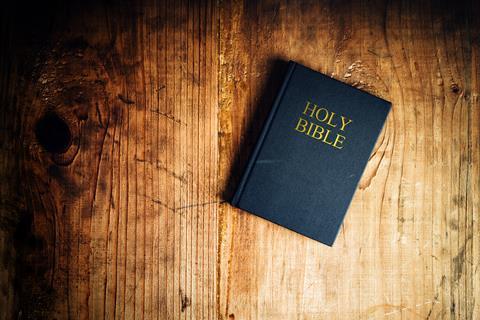Donald Trump making $1.3m from sales of the ‘God Bless the USA’ Bible has caused outrage among some Christians. But where our Bibles are made and who profits from sales of scripture is more complex – and controversial – than you might think. Tim Wyatt explores

The figures were startling. Donald Trump has earned more than $1.3m in licensing fees from sales of his ‘God Bless the USA’ Bible, according to official financial disclosures by the White House.
The Bibles - which sell for up to $99, despite costing only $3 each to print in China - are unlikely to have made much of a dent in the UK market, given that they also include a copy of the US Constitution, the pledge of allegiance and the lyrics to a patriotic song by American country singer Lee Greenwood.
But who is profiting off the Bibles that Christians do buy in this country? When you purchase a new version of the Good Book, where does your £24.99 actually end up? The answer is more complicated than you might think - and tells us quite a bit about the Bible publishing industry.
Lost in translation
The journey begins with those who make the translation into English in the first place.
Most translations today are commissioned by some kind of parachurch organisation. For instance, the New Revised Standard Version (NRSV) was overseen by the National Council of Churches, an American umbrella group of denominations. The English Standard Version (ESV) was commissioned by Crossway, an evangelical publisher.
The New International Version (NIV) was pulled together by what was then the International Bible Society (now known as Biblica). The New Living Translation (NLT) belongs to a Christian publisher, Tyndale House. The Good News Bible was commissioned by the American Bible Society.
The vast majority of Bibles are printed in China - a totalitarian, atheist dictatorship
Most of these groups hire a committee of scholars to do the actual work of translating the text from ancient Greek and Hebrew sources into English. If they are a publisher, they then print their own Bibles. But other major translations - such as the NIV or NRSV - are licensed by their copyright holders to publishers.
Typically, about 5-15 per cent of the price of a Bible will be paid back to these parachurch groups in royalty fees. The King James Version (KJV) is Crown copyright, although it is licensed to Cambridge University Press, who ultimately receive the royalties. However, Crown copyright is ignored in the US, which means the KJV text is available copyright-free. It is therefore a popular choice for publishers trying to produce very low-cost Bibles.
Design and print
The next link in the chain is the publisher, who will typically receive 30-40 per cent of the price paid by the consumer. Their job is to design and print the text, purchased from the copyright holder, onto paper and bind it into books.
This was once a fairly standard bit of work, but today there are a dizzying array of cover options, text sizes and extra additions to choose from, even within one translation. A classic black leather cover or a stylised pink floral pattern. Bibles with study notes, illustrations and maps. Even empty pages for journalling. Derek Hill, managing director of the British Bible Society’s publishing arm, said a large part of his job was to emphasise the “tactile element” of a physical Bible in the face of competition from Bible apps.
Hodder Faith, who exclusively publish the NIV in Britain, said they offer around 150 different types of NIV Bible. Chairperson Ian Metcalfe said the production cost was unusually high compared to paperbacks, which could usually be churned out for less than £1 a copy. Up to 20 per cent of the cost of a Bible could simply be the especially thin (but expensive) paper and the ink needed to print onto it. The rest goes on editing, staff costs, distribution centres and more.
“I envy Mars selling a Mars bar,” Metcalfe joked. To keep costs down, the chocolate bar has got smaller over time, he reflected. “Whereas the Bible is the Bible.” The binding and covers, especially for pew Bibles designed for church use, must also be extra durable.
Free to me?
But alongside these, there are also ‘outreach’ Bibles, mass-produced and ultra-cheap paperback versions intended to be given away to non-Christians. Aude Pasquier, retail sales director for Christian publishers Hymns Ancient & Modern, said they sold a New Testament for just 99p.
Jonathan Carswell, president of bookseller 10ofthose, said his team had seen astonishing growth in sales of outreach Bibles– upwards of 400 per cent year on year. The ESV lags behind sales of more popular translations, he said, but because they offered a slim ‘economy’ version that only costs £2, they were shifting tens of thousands every year. “There is this high demand for it. Churches and ministries are saying: ‘If you want a free Bible here is one for you’.”
Yet there is a nagging question, Pasquier said, especially with the cheaper versions of scripture. The vast majority of Bibles are printed in China - which offers the most competitive costs but is also a totalitarian, atheist dictatorship which oppresses Christians and restricts sales of the Bible within its own borders. Those with plenty of money to spend could choose premium Bibles that are printed closer to home, but the ethical purchaser who does not want to break the bank will struggle, she said.
Amazonian profits
Once the publisher has printed its Bible, it then sells them in bulk to bookshops, websites or distributors. Typically, they are given discounts of up to 50 per cent on the retail price and therefore account for the rest of your £24.99 purchase price. Competition from the likes of Amazon has laid waste to what was once a thriving Christian bookshop sector, although new entrants such as 10ofthose have emerged online too.
What might surprise some believers is the extent to which Bibles are part of the wider publishing world. Although the groups which commission and translate the scriptures are all Christians, the companies who actually get the NIV, NRSV or ESV text into your hands are often secular conglomerates. Hodder has a long history of Bible publishing but has been a subsidiary imprint of French publishing giant Hachette for years. Zondervan, who publish the NIV in America, are part of HarperCollins. And so, a portion of your money ends up in the pockets of the executives and shareholders of these multinationals, too.
Some have raised questions about the risks of leaving the critical task of publishing God’s word in the hands of non-church groups. One Christian bookseller, who didn’t want to be named, pointed out that HarperCollins are part of Rupert Murdoch’s group of businesses. “Rupert Murdoch isn’t selling Bibles out of the goodness of his heart. He is selling Bibles to make money.”
The bookseller added that if he tried to match Amazon’s prices, he’d go out of business, given that Amazon sells the Bible not to generate profit but as a loss leader, to entice shoppers to then purchase other, more lucrative items on the shopping site. Jeff Bezos does not care whether the Bible you purchased from him helps you spiritually or not, he added. “He just wants to fund his space project so he can beat Elon Musk.”
Money talks
In contrast, Hill said that profits made from Bible Society sales were funnelled back into more Bibles, essentially paying for translations into under-served languages around the world.
This raises an important question for Christians said Carswell: When purchasing a Bible, does the place you buy it from care for your spiritual health as much as you do? Amazon might flog you an ESV to help their bottom line, but can they be trusted to resource your walk with God faithfully?
But the issue of profitability and where the money goes is undeniably complex. Carswell said 10ofthose primarily sold Bibles because it was the “only book that is infallible and unchanging and gives life. I want to get that out because God works through his word.” Yet the organisation is still a business, not a ministry. Even the ultra-cheap outreach Bibles cover their costs.
Competition from the likes of Amazon has laid waste to what was once a thriving Christian bookshop sector
Most of Metcalfe’s team at Hodder, despite working for a secular multinational, are churchgoing Christians who are in Bible publishing for the right reasons. Their division must justify itself to Hachette bosses by making profit from the Good Book, but Metcalfe said this brought welcome rigour and discipline.
“I think there’s a danger that we look down on business from a Christian perspective”, he said. Being part of a bigger, secular publisher meant it was easier to get the Bible stocked in major retailers and, ultimately, most of the profit made on Bible sales is reinvested into developing and printing the next wave of Bibles.
And is much money made by selling Bibles? Even those working in the sector disagree on this question. Carswell said there was plenty of cash to be made, especially in the enormous US market. But others disagreed. Hill said it was “really, really tough” outside of America.
Pasquier said the cost of typesetting and printing a new Bible edition meant margins were slim. But if it continued to sell well for years, it could become fairly profitable. Metcalfe, who said Hodder sold in the region of 280,000 Bibles last year, described the industry as a “pretty steady earner”.
“People always want Bibles. They are not as profitable - nor as risky - as publishing the latest John Grisham.”






































1 Reader's comment